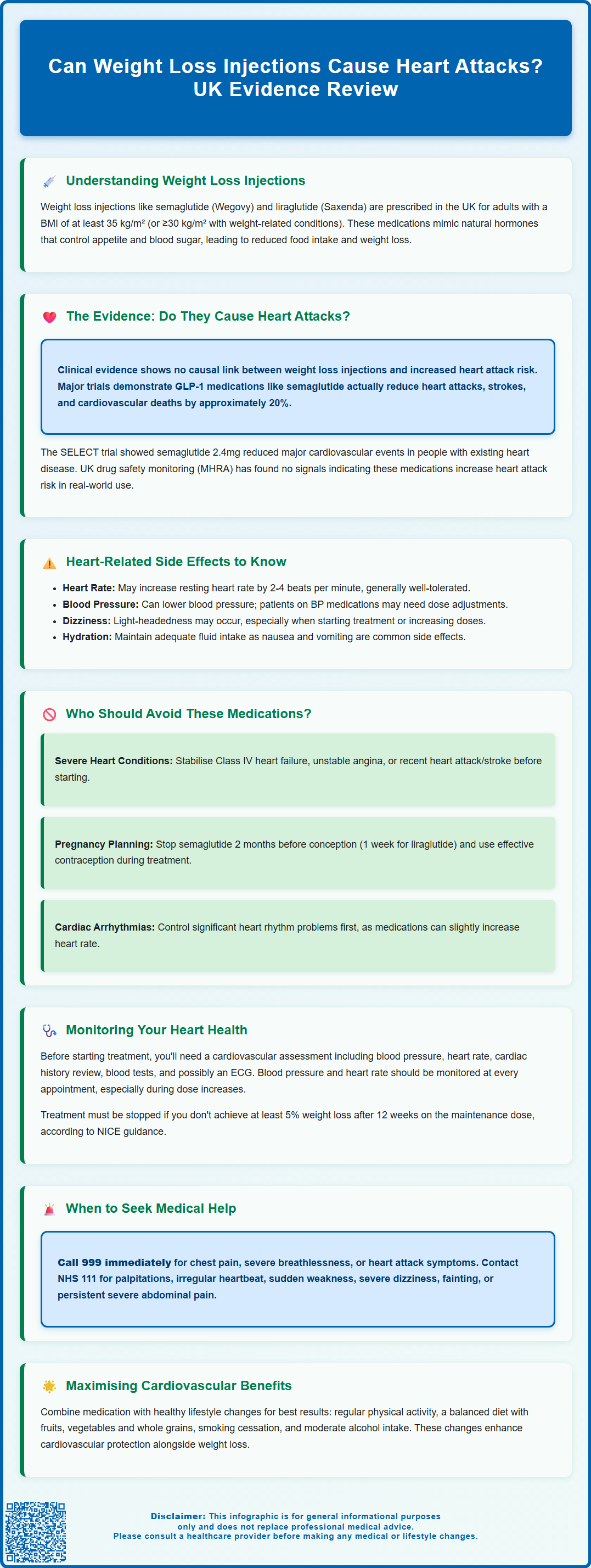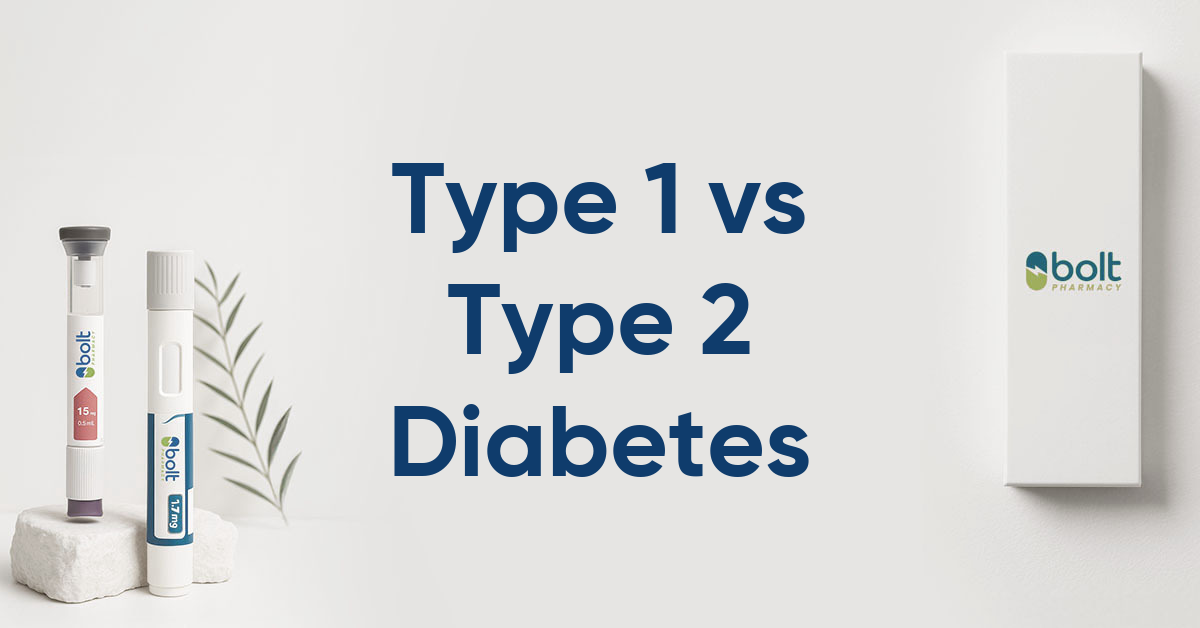Can weight loss injections cause heart attacks? This question concerns many considering GLP-1 receptor agonists like semaglutide (Wegovy) or liraglutide (Saxenda) for obesity management. Current clinical evidence shows no causal link between these medications and increased heart attack risk. In fact, large-scale trials demonstrate cardiovascular benefits, with semaglutide reducing major cardiac events in high-risk patients. Understanding the evidence-based safety profile of these NICE-approved treatments helps patients and clinicians make informed decisions about weight management within specialist NHS services.
Summary: Weight loss injections do not cause heart attacks; clinical evidence shows GLP-1 receptor agonists like semaglutide actually reduce cardiovascular risk in high-risk patients.
- GLP-1 receptor agonists (semaglutide, liraglutide) are NICE-approved for obesity management in specialist weight management services for adults with BMI ≥35 kg/m² or ≥30 kg/m² with comorbidities.
- The SELECT trial demonstrated semaglutide 2.4mg reduced major adverse cardiovascular events in patients with established cardiovascular disease without diabetes.
- These medications may cause modest heart rate increases (2-4 beats per minute) and require monitoring for blood pressure changes, particularly in patients on antihypertensive therapy.
- Absolute contraindications include hypersensitivity to the medication, pregnancy, and breastfeeding; patients with severe heart failure or recent cardiac events require specialist assessment.
- NICE guidance mandates continuation criteria (5% weight loss after 12 weeks on maintenance dose) and typically limits Wegovy treatment to 2 years maximum.
- MHRA post-marketing surveillance shows no signal of increased myocardial infarction risk; any new chest pain or cardiac symptoms require immediate medical assessment.
Table of Contents
- Understanding Weight Loss Injections and Cardiovascular Safety
- Can Weight Loss Injections Cause Heart Attacks?
- Heart-Related Side Effects of GLP-1 Medications
- Who Should Avoid Weight Loss Injections for Heart Health Reasons?
- Monitoring Your Heart Health During Weight Loss Treatment
- Scientific References
- Frequently Asked Questions
Understanding Weight Loss Injections and Cardiovascular Safety
Weight loss injections, particularly glucagon-like peptide-1 (GLP-1) receptor agonists such as semaglutide (Wegovy) and liraglutide (Saxenda), are prescribed in the UK for weight management in adults with obesity or overweight with weight-related comorbidities. According to NICE Technology Appraisals (TA875 and TA664), these medications are specifically indicated for adults with a BMI of at least 35 kg/m² (or ≥30 kg/m² with weight-related comorbidities) and must be prescribed within specialist weight management services. These medications work by mimicking natural hormones that regulate appetite and blood glucose levels, leading to reduced food intake and subsequent weight loss.
The cardiovascular safety profile of weight loss injections has been extensively studied through large-scale clinical trials. The SELECT trial (Semaglutide Effects on Heart Disease and Stroke in Patients with Overweight or Obesity) demonstrated that semaglutide 2.4mg actually reduced the risk of major adverse cardiovascular events by approximately 20% in people with established cardiovascular disease but without diabetes. This finding is significant, as obesity itself is a major risk factor for heart disease, and effective weight loss can improve multiple cardiovascular risk factors including blood pressure, cholesterol levels, and inflammatory markers.
NICE guidance acknowledges the cardiovascular benefits observed with specific GLP-1 receptor agonists, particularly semaglutide 2.4mg in people with established cardiovascular disease, and liraglutide 1.8mg in people with type 2 diabetes and cardiovascular disease. However, as with all medications, individual patient assessment remains essential to ensure appropriate prescribing and monitoring throughout treatment. It's important to note that NICE specifies treatment duration limits, with Wegovy typically prescribed for up to 2 years.
Can Weight Loss Injections Cause Heart Attacks?
Based on current clinical evidence, there is no established causal link between weight loss injections and an increased risk of heart attacks. In fact, the evidence suggests the opposite effect for specific GLP-1 receptor agonists. The SELECT trial, published in the New England Journal of Medicine, specifically examined semaglutide 2.4mg in over 17,000 adults with overweight or obesity and established cardiovascular disease but without diabetes, demonstrating a significant reduction in heart attacks, strokes, and cardiovascular deaths.
It is important to distinguish between causation and coincidental occurrence. People prescribed weight loss injections often have multiple cardiovascular risk factors including obesity, hypertension, dyslipidaemia, and sedentary lifestyle. These underlying conditions themselves substantially increase heart attack risk. When a cardiovascular event occurs in someone taking weight loss medication, it may reflect their pre-existing risk profile rather than a medication effect. Post-marketing surveillance by the MHRA continues to monitor real-world safety data, with no signal indicating increased myocardial infarction risk emerging to date.
It's worth noting that the cardiovascular benefits demonstrated in clinical trials vary by specific medication, dose, and patient population. The strongest evidence for cardiovascular risk reduction exists for semaglutide 2.4mg in patients with established cardiovascular disease (SELECT trial) and liraglutide 1.8mg in type 2 diabetes (LEADER trial), while the obesity-dose of liraglutide (Saxenda 3mg) has demonstrated cardiovascular safety but not superiority.
Any new or worsening chest pain, breathlessness, or other cardiac symptoms during treatment requires immediate medical assessment. If you suspect a heart attack, call 999 immediately. Whilst the medication itself does not cause heart attacks, patients should remain vigilant about cardiovascular warning signs.

Heart-Related Side Effects of GLP-1 Medications
Whilst GLP-1 receptor agonists do not cause heart attacks, they can produce cardiovascular-related effects that patients should understand. According to the Summary of Product Characteristics (SmPC) for these medications, a modest increase in resting heart rate, typically by 2-4 beats per minute on average, may occur. This modest elevation is generally well-tolerated and not associated with adverse outcomes in clinical trials. The mechanism relates to the medications' effects on autonomic nervous system activity. However, patients with pre-existing tachyarrhythmias should be monitored appropriately, and any palpitations or irregular heartbeat should be reported to their GP.
Some patients experience dizziness or light-headedness, particularly when initiating treatment or increasing doses. This may relate to changes in blood pressure, dehydration from gastrointestinal side effects, or postural hypotension. Adequate hydration is essential, especially given that nausea and vomiting are common side effects that can lead to fluid depletion. Patients taking antihypertensive medications may require dose adjustments as weight loss and direct medication effects can lower blood pressure, potentially causing symptomatic hypotension.
Rarely, acute pancreatitis has been reported with GLP-1 receptor agonists, which can occasionally present with chest or upper abdominal pain that patients might confuse with cardiac symptoms. The MHRA Drug Safety Updates have highlighted this risk. Severe, persistent abdominal pain radiating to the back warrants immediate medical assessment and treatment discontinuation pending investigation. Additionally, gallbladder disease (including gallstones) has been associated with GLP-1 receptor agonists and can also present with upper abdominal pain. Regular clinical review allows early identification of any concerning symptoms, ensuring patient safety throughout the treatment course.
Who Should Avoid Weight Loss Injections for Heart Health Reasons?
Whilst weight loss injections demonstrate cardiovascular benefits in many patients, certain individuals require careful assessment or may need to avoid these medications. According to UK Summaries of Product Characteristics (SmPCs), the absolute contraindications for GLP-1 receptor agonists include hypersensitivity to the active substance or any excipients, and use during pregnancy or breastfeeding. The SmPCs include a precautionary statement regarding thyroid C-cell tumours observed in animal studies (though this has not been confirmed in humans), but this is not listed as a contraindication in the UK as it is in some other countries.
Patients with severe heart failure, particularly those with recent decompensation or New York Heart Association Class IV symptoms, should receive specialist cardiology input before considering weight loss injections. Although some evidence suggests potential benefits in stable heart failure, the safety profile in advanced disease is less well-established. Similarly, individuals with unstable angina, recent myocardial infarction, or recent stroke would benefit from achieving cardiovascular stability before initiating weight loss treatment. These patients benefit from optimisation of their cardiac medications and risk factor management under specialist supervision.
Those with significant cardiac arrhythmias, particularly if symptomatic or requiring ongoing investigation, should have their rhythm disturbance adequately controlled before starting GLP-1 therapy. The modest heart rate increase associated with these medications could theoretically exacerbate certain arrhythmias. For patients with severe renal impairment, the SmPCs for semaglutide and liraglutide do not recommend specific dose adjustments, but advise caution due to limited experience in this population and potential dehydration risks from gastrointestinal side effects.
Women of childbearing potential should use effective contraception during treatment. For those planning pregnancy, semaglutide should be discontinued at least 2 months before a planned pregnancy due to its longer half-life, while liraglutide has a shorter washout period of approximately 1 week. A thorough cardiovascular assessment including blood pressure measurement, ECG where indicated, and review of cardiovascular risk factors should precede any prescription, ensuring treatment appropriateness for each individual patient.
Monitoring Your Heart Health During Weight Loss Treatment
Appropriate monitoring throughout weight loss injection treatment ensures early identification of any cardiovascular concerns whilst maximising therapeutic benefits. Before starting treatment, your healthcare provider should conduct a comprehensive cardiovascular assessment including blood pressure measurement, heart rate documentation, and review of any cardiac symptoms or previous cardiovascular events. Baseline blood tests typically include renal function, lipid profile, and HbA1c if diabetes is present or suspected. An ECG may be requested if you have cardiovascular risk factors, symptoms, or abnormal examination findings.
During treatment, regular follow-up appointments allow monitoring of cardiovascular parameters alongside weight loss progress. According to NICE guidance (TA875 and TA664), specific continuation criteria must be met to remain on treatment. For Wegovy (semaglutide), treatment should be discontinued if a 5% reduction in body weight is not achieved after 12 weeks on the maintenance dose. For Saxenda (liraglutide), at least 5% weight loss must be achieved after 12 weeks on the 3mg daily dose to continue treatment. These assessments must take place within specialist weight management services.
Blood pressure and heart rate should be checked at each visit, particularly during dose escalation phases. If you take medications for hypertension, diabetes, or cholesterol, doses may require adjustment as weight loss and direct medication effects improve these parameters. Your healthcare team will coordinate any necessary changes to optimise your overall cardiovascular risk profile.
Patients should be vigilant for warning signs requiring urgent medical attention. Call 999 immediately if you experience chest pain or tightness, severe breathlessness, or symptoms suggestive of a heart attack. Contact NHS 111 for urgent advice if you experience palpitations or irregular heartbeat, sudden weakness or numbness, severe dizziness or fainting, or persistent severe abdominal pain. These symptoms warrant prompt evaluation regardless of whether they relate to the medication.
Maintaining a healthy lifestyle alongside medication optimises cardiovascular outcomes. Regular physical activity appropriate to your fitness level, a balanced diet rich in fruits, vegetables, and whole grains, smoking cessation, and moderation of alcohol intake all contribute to heart health. This holistic approach, combining medication with lifestyle modification and appropriate monitoring, maximises cardiovascular benefits whilst ensuring your safety throughout your weight loss journey. Remember that NICE guidance typically limits Wegovy treatment to a maximum of 2 years.
Scientific References
- Semaglutide for managing overweight and obesity. Technology Appraisal Guidance TA875.
- Liraglutide for managing overweight and obesity. Technology Appraisal Guidance TA664.
- Wegovy 0.25 mg, FlexTouch solution for injection in pre-filled pen - Summary of Product Characteristics.
- Saxenda 6 mg/mL solution for injection in pre-filled pen - Summary of Product Characteristics.
- Semaglutide and Cardiovascular Outcomes in Obesity without Diabetes.
- Obesity - Treatment.
Frequently Asked Questions
Are weight loss injections safe for people with heart disease?
Clinical trials show that semaglutide 2.4mg actually reduces cardiovascular events in people with established heart disease. However, patients with severe heart failure, recent heart attacks, or unstable angina should receive specialist cardiology assessment before starting treatment.
What heart-related side effects can GLP-1 medications cause?
GLP-1 receptor agonists may cause a modest increase in resting heart rate (2-4 beats per minute) and can lower blood pressure, potentially requiring adjustment of antihypertensive medications. Dizziness and light-headedness may occur, particularly during dose escalation.
How is heart health monitored during weight loss injection treatment?
Healthcare providers monitor blood pressure and heart rate at each visit, particularly during dose escalation. Baseline cardiovascular assessment includes blood pressure, heart rate, and ECG where indicated, with regular follow-up within specialist weight management services as per NICE guidance.
The health-related content published on this site is based on credible scientific sources and is periodically reviewed to ensure accuracy and relevance. Although we aim to reflect the most current medical knowledge, the material is meant for general education and awareness only.
The information on this site is not a substitute for professional medical advice. For any health concerns, please speak with a qualified medical professional. By using this information, you acknowledge responsibility for any decisions made and understand we are not liable for any consequences that may result.
Heading 1
Heading 2
Heading 3
Heading 4
Heading 5
Heading 6
Lorem ipsum dolor sit amet, consectetur adipiscing elit, sed do eiusmod tempor incididunt ut labore et dolore magna aliqua. Ut enim ad minim veniam, quis nostrud exercitation ullamco laboris nisi ut aliquip ex ea commodo consequat. Duis aute irure dolor in reprehenderit in voluptate velit esse cillum dolore eu fugiat nulla pariatur.
Block quote
Ordered list
- Item 1
- Item 2
- Item 3
Unordered list
- Item A
- Item B
- Item C
Bold text
Emphasis
Superscript
Subscript












